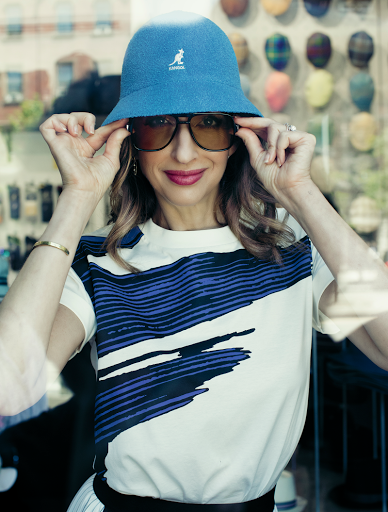CULTURE
CURTAIN CALL WITH ALYSIA REINER
JULY 25, 2019
-
PHOTOGRAPHY
by TATIJANA SHOAN
@tatijanashoan
STYLING & INTERVIEW
by KRISTOPHER FRASER
@krisfashion1
MAKEUP
by KORNELIJA SLUNJSKI for HONEYARTISTS
@kokobeaute @honeyartists
HAIR
by GEORGE KYRIAKOS for HONEY ARTISTS
@stylebookings @honeyartists
I first became familiar with actress Alysia Reiner's work through the groundbreaking Netflix series Orange is the New Black. Reiner, who plays assistant prison warden Natalie Figueroa, a.k.a. Fig, has had a long career in television, film, and theatre. Throughout the course of series Fig goes from a corrupt prison warden to a voice of reason and sense in a sea of much worse corruption.
Vivacious, witty, and occasionally biting, Fig might seem like the ex-mean girl turned corporate professional, but she is far more nuanced than that. Reiner, in contrast to her popular Netflix character, is warm, humorous, and amicable.
Walking into her bathroom, I couldn't help but laugh at a sign that read "Animal Flatulance." It was clear despite the tough persona of her character on the series, this is a woman who was all heart and all love.
She managed to find time in her busy acting schedule for us to discuss the end of Orange is the New Black, upcoming acting projects, and how she's become even more of an activist in our turbulent times. It's an interesting time for this interesting lady.

Kangol bucket hat | BOSS T-shirt and skirt
AS IF: So, let’s talk about you finding out when you got your role on Orange is the New Black. However many years ago that was, take me to that moment, I want to hear about that feeling.
AR: Sure. I originally auditioned for Alex. I loved the script beyond words, but I didn’t get the role, and I was, you know demolished the way every actor is. Then they had me in to audition for Polly, who’s her best friend, and I didn’t get that, and I was heartbroken. And then, I remember being in my living room and they called me and said, ‘They’re offering you a role as the assistant to the warden. It’s two lines.' It was two lines, but I loved the script so much I was like 'yes' and then it grew into a little bit more than two lines.
Did you read the book before?
I did. Once I got the audition, I definitely read the book, and then I also visited some prisons and interviewed a bunch of wardens and assistant wardens and all that good stuff.
How’d the book hit you?
It's funny, it's very different. I like to say in the book it's more like this awful thing or this crazy thing almost happened but then it didn’t, and then in the show, the crazy thing happened.
So, what were some of your favorite “oh shit!” moments over the course of the series? Like things that shocked you throughout the course of the series. Where you were all like—you were sitting there like on set or maybe even reading the script—
Oh, when they killed Poussey, we all were like “NOOO!” There’ve been so many, and that to me is the mark of brilliant writing and show running by Jenji Kohan, she’s always kept fantastic drama and fantastic humor and fantastic pathos like you’re on the edge of your seat and you care deeply and you're laughing at the same time. And that’s a deep gift to be able to be of service to stories like that. And particularly this year, I feel beyond words grateful to be of service to this story because of what’s happening in the world with the immigration crisis, and because of what’s happening in America, and we hint about it at the end of season 6 when PolyCon talks about ICE, and I can’t really say much more, but to say we really go there in season 7. I think we all can feel so hopeless. I’ve protested, I’ve marched, I’ve called, I’ve sent money, I hope to go down to border, and I volunteer with foster organizations, but I can still feel so deeply helpless. One of the salvations to my soul has been knowing that I’m making art that’s talking about what’s going on, to make more people aware and awake to what’s going on that is unacceptable in our country. To hopefully wake them up and have them join us in saying ‘This is not okay,’ and telling their political representatives, ‘We will not stand for this. America is a democracy and you must listen to the people.’


